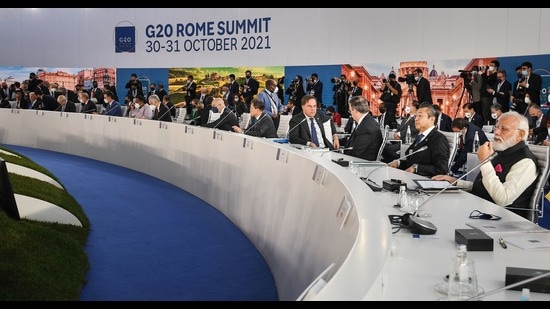Why G20 will acquire greater salience in Indian foreign policy
It is a natural transition to India sharpening its economic diplomacy, and showcasing its leadership role
At its recent summit in Rome, G20 took several important steps to accelerate economic recovery, enhance health security and strengthen multilateralism. The Rome Declaration consists of 51 paragraphs, anchored in 20 ministerial declarations and 29 working group documents. Here are five key outcomes.

One, G20 noted that post-pandemic, economic recovery was moving at “a solid pace” but it was “highly divergent across and within countries”. The major economies committed to sustain the recovery and avoid “any premature withdrawal” of support measures, but also prioritise financial stability and long-term fiscal sustainability.
Two, the top priority on the health front is assigned to ensuring “timely, equitable and universal access” to vaccines, therapeutics and diagnostics. G20 accepted the World Health Organization (WHO)’s recommendation to vaccinate 40% of the global population by the end of 2021 and 70% by mid-2022. This necessitates considerable expansion in production, supply-chain resilience and financial resources. As Antonio Guterres, the United Nations (UN) Secretary General pointed out, “While wealthy countries are rolling out third doses of the Covid-19 vaccine, only about 5% of people in Africa are fully vaccinated. This is a global shame.”
Three, with health security in the future being a significant concern, stress was laid on — pandemic preparedness and response (PPR) — so the world can handle future pandemics better than it did Covid-19. Two specific measures agreed upon for this purpose include the formation of a joint taskforce of finance and health ministers, and establishment of “a financial facility” in coordination with WHO.
Four, on the inter-linked themes of energy and climate, the leaders resolved to work for the success of the Glasgow conference by reaffirming their commitment to the full implementation of the UN Framework Convention on Climate Change and the Paris Agreement. The notable forward step was “to pursue efforts” to limit the global average temperature to 1.5°C above pre-industrial levels, as part of moving towards the global net-zero goal. But sufficient balancing was done to accommodate the developing countries’ perspective that “different approaches” and “clear national pathways” should be taken into account.
Importantly, developed countries have been reminded of their obligations regarding more outflow of finance and technology as well as to adopt “sustainable and responsible consumption and production” patterns, in harmony with the 2030 Sustainable Development Agenda. This is the message Prime Minister (PM) Narendra Modi reiterated in Glasgow.
Five, on the financing needs of developing countries, the International Monetary Fund will establish a new Resilience and Sustainability Trust (RST) which will provide affordable long-term assistance to low-income countries. This will build on the G20 Debt Service Suspension Initiative (DSSI), created under the Saudi G20 presidency in 2020. So far, a total debt of $12.7 billion has been deferred, bringing considerable relief to developing countries. Measures beyond DSSI are also under consideration. Reform in international taxation and endorsement of a 15% minimum tax rate for corporations is truly “a historic achievement”, indicating that G20 persuaded profit-makers to accept this in self-interest.
The Indian delegation, led by PM Modi, played a significant, probably defining, role, especially in the absence of top Eurasian leaders. The imprint of India’s contribution was visible in formulations relating to health, climate, energy, agriculture, international taxation, anti-corruption and counter-terrorism measures — all issues persistently pursued by India at G20 discussions. Modi’s pull-asides and bilateral meetings with key participants helped. Even as India announced its goal to reach net-zero emissions by 2070, Piyush Goyal, India’s G20 Sherpa, reminded the media that technologies needed to transition to clean energy and innovation still did not exist. With India’s start-up sector blooming, such innovations could well come from India before they are readied by the West.
The next three nations to hold the G20 presidency are Indonesia in 2022, India in 2023 and Brazil in 2024 – three developing countries. From December 1 2021, the new G20 troika will comprise Italy, Indonesia and India. G20 will now acquire greater salience in India’s foreign policy. It is a natural transition to India sharpening its economic diplomacy, and showcasing its leadership role in world affairs.
Rajiv Bhatia is distinguished fellow, Gateway House and a former ambassador
The views expressed are personal
Continue reading with HT Premium Subscription




